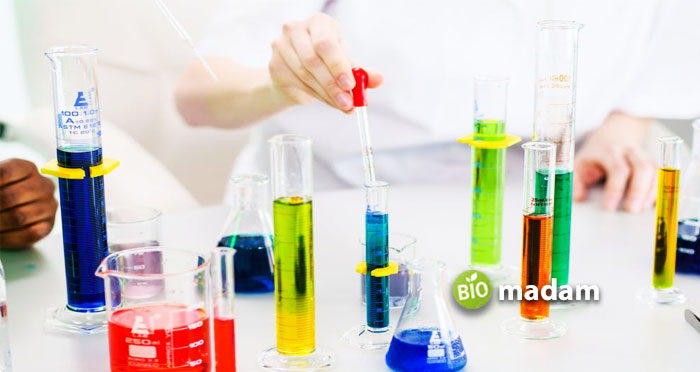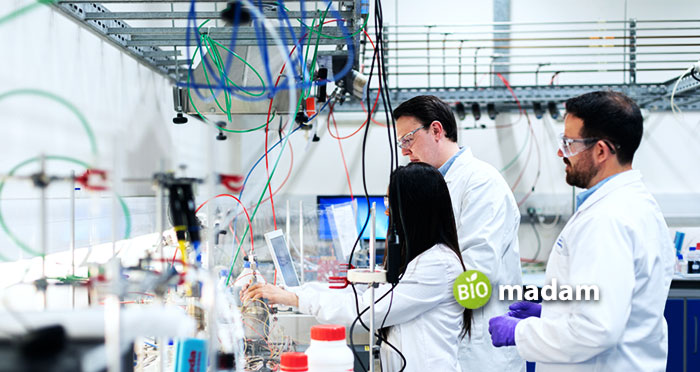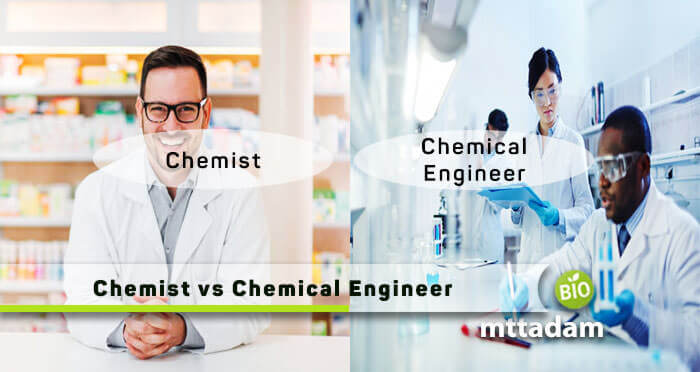Students usually make up their minds in matriculation to opt for a specific field which can be any! Some like biology so they go for MBBS, Bs. Zoology, Bs. Botany, etc. Others love to study chemistry, so want to become a chemist soon. Here is the misconception that could confuse most students, which are the words chemist and chemical engineer.

If you’re wondering first, what is a chemist? It is actually a person who is well trained in certain branches of chemistry and thus applies his earned knowledge in the profession. The profession expands to experimentation and research apart from the stereotypical professions of teaching and pharmacy-related work. The main aim of the chemists lies in understanding the chemical reactions and then explaining the mechanisms behind them.
On the other hand, students looking to know about what is a chemical engineer, understand that it belongs to a subfield of both engineering and chemistry His main task is to work in the chemical industry to convert the primary raw material of different chemicals into various products. These engineers, furthermore, utilize their knowledge in different duties, including dealing with the plants and operating systems/equipment for introductory purposes. In the advanced scenario, chemical engineers also actively engage in the research activities working for various developments.
While a chemist belongs to the most basic of the sciences, i.e., chemistry, and the job opportunities are also as such, the job of a chemical engineer is more oriented around technology in chemistry and the advancement of the technology. Let’s dive a bit deeper into how the two fields and their professional personnel differ.
Learning Objectives of the Two Fields

Chemistry is quite a broad discipline, engaging students from gaining complete conceptual and bookish knowledge with extensive lab and research work. The purpose lies in the preparation of the chemists, not only for making them experts in their fields rather sensitive nature of the job as chemists but also to prepare them to be future scientists and chemistry explorers. That is why the bachelor’s programs for a chemist include general subjects, such as chemistry, organic chemistry, inorganic chemistry, biochemistry, applied chemistry, and mathematics, to name the major.
Contrary to the bachelor’s coursework for a chemistry degree, students wishing to pursue a career in chemical engineering have to follow a multidisciplinary approach embedded in the field of engineering itself. As it is an amalgam of the two fields – i.e., chemistry and engineering, the students following a career in this field are trained accordingly. For instance, the core subjects in the syllabus of chemical engineering orient about engineering, mathematics, computer sciences, fluid dynamics, and equipment design.
However, both the subject produce professionals well equipped with the relevant skills in the respective fields.
Best Institutes to Study
Students who genuinely are interested in pursuing a career in any of the two fields should look and choose the best institute to study. Let’s look at the top universities following the fields, i.e., chemist vs chemical engineer. The table below gives a good overview and comparison (as per the ranking of universities in the QS system).
According to QS Ranking 2023
| Chemistry (Top Universities) | Chemistry | Chemical Engineering (Top Universities) | Chemical Engineering |
|---|---|---|---|
| Massachusetts Institute of Technology (MIT) | 1 | Massachusetts Institute of Technology (MIT) | 1 |
| University of Cambridge | 2 | Stanford University | 2 |
| University of Oxford | 3 | University of Cambridge | 3 |
| Harvard University | 4 | University of California, Berkeley | 4 |
| Stanford University | 5 | ETH Zurich | 5 |
Responsibilities
The experts in both fields are allotted some typical yet same duties, so if students get confused in, “What does a chemist do” and “What does a chemical engineer do” – they are pretty similar. Both fields include active involvement in plan designing and development related to their respective fields of chemical/product or systems/equipment manufacturing and advancement. Let us take in a detailed view of the responsibilities carried out by chemists and chemical engineers.
Chemists
The entry-level positions of chemists require a minimum of a bachelor’s degree in chemistry. If such jobs interlink with research-oriented responsibilities, one should have an extensive understanding of mathematical skills. Most research areas require systematic data analysis, which makes mathematical skills an utmost necessity. Moreover, the primary job responsibilities are indoor work related to designing experiments, their execution within labs, and data analysis to develop new chemical compounds or products.

Besides, research may also be used for basic science searching, purposed to make the science of chemistry more and more acceptable. Furthermore, a chemist is also responsible for making proper documentation about his work, such as writing reports of the experiments carried out and, in advanced scenarios, writing research papers for publishing the work done. Also, a skilled chemist should oversee and make sure the lab protocols are being correctly followed.
Chemical Engineers
These experts are typically involved in manufacturing processes. The most common is manufacturing food, drugs, fuels, etc., on a larger scale. The initial job as a chemical engineer also requires a bachelor’s degree in chemical engineering, just like chemists. Besides performing the standard manufacturing tasks, a chemical engineer also serves the active researches. Here again, the primary focus of these engineers is to improve the manufacturing processes through various techniques. These improvements are then put into the applied field of chemical engineering research, such as an improved production of drugs and chemicals that can be achieved at a larger scale.

Therefore, some of the essential job responsibilities of chemical engineers are summarized as:
- Working with the existing manufacturing processes
- Researching for the betterments in the existing designs of equipment
- Scheming new manufacturing equipment
- Providing and developing safety protocols according to the equipment
- Preparing budgets and documentation of all kinds which might apply to a particular scenario, etc.
How are the Chemists & Chemical Engineers Connected?
Besides many prominent differences between chemist and chemical engineer, these two professions are pretty close to each other. However, we can still connect them. They work in solid connection with one another, thereby complementing the mission of designing a product till its large-scale production. Let me give you an example for a better understanding.
A chemist works in a research lab and produces a new formula for a sanitizer under all the health and safety measures. Now, after he prepared a sanitizer, he might make its few bottles in that particular laboratory. But, to produce it in a bulk amount available in the market, the industry wants a chemical engineer. He would suggest and provide unique equipment for its large-scale production, hence, promoting sales.

Jeannie has achieved her Master’s degree in science and technology and is further pursuing a Ph.D. She desires to provide you the validated knowledge about science, technology, and the environment through writing articles.

